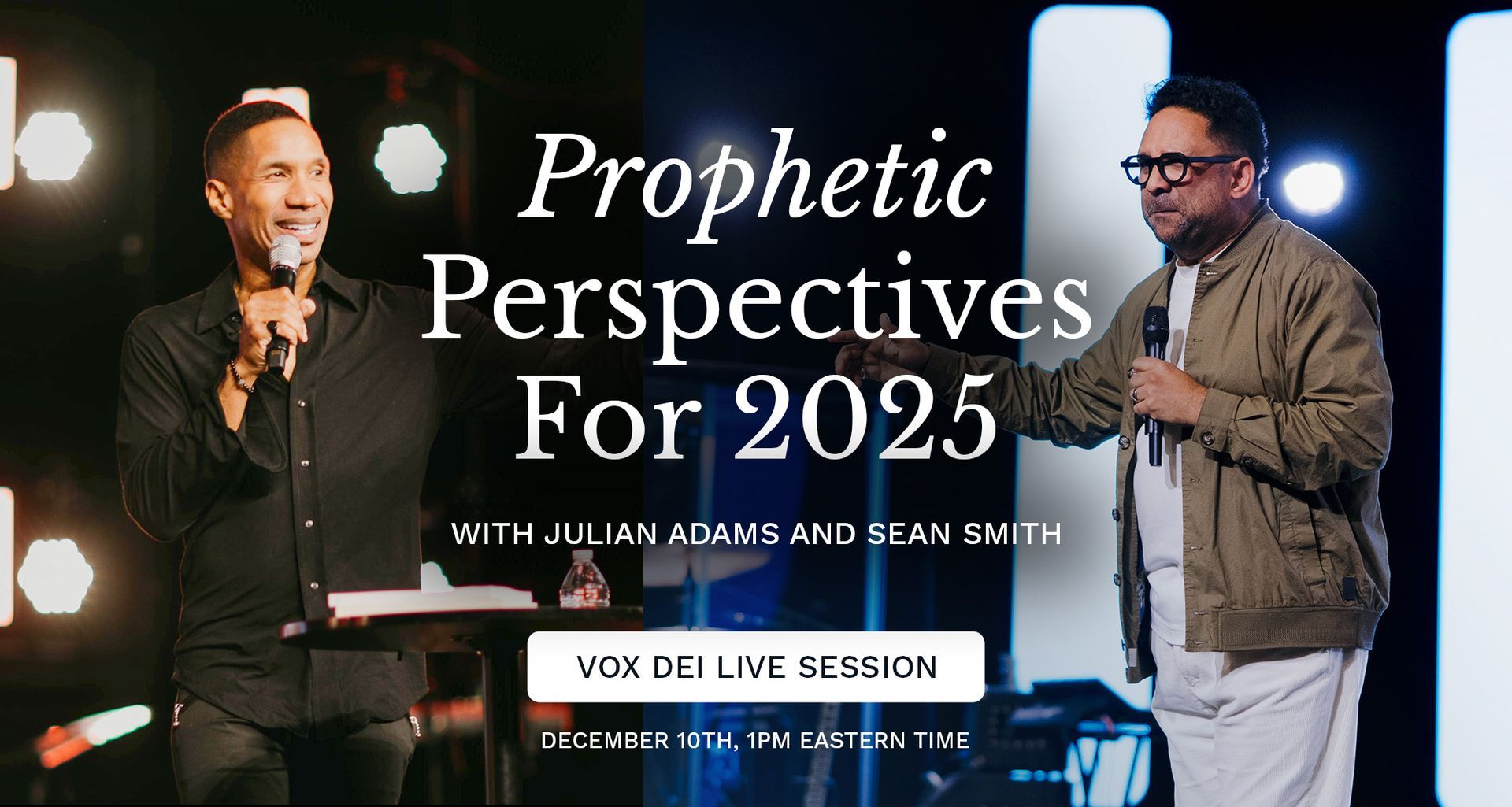The Purpose of the Prophetic
ANTHONY HILDER • September 18, 2018

— This is an excerpt from Anthony Hilder’s new book Hearing the Heart of Heaven: Developing a Personal Prophetic Culture.
—
Prophecy is a spiritual gift – one of many – that God gives the church. Spiritual gifts are abilities that God gives to Christians to harness His power and benefit others around them. There are a couple of lists in the Bible and some gifts seem pretty impressive. Miracles! Healings! Leadership! Others are more mundane and a lot less sexy. Helps – notice, no exclamation mark. Giving. Administration. On a side note, celibacy and martyrdom are also spiritual gifts and I can promise you that the only prayers I’ve prayed about those gifts are that God wouldn’t give them to me.
The point is, though, that God is interested in the ordinary details of life, and living life in a supernatural and loving way. So whilst the seeming boring gifts seem, well, pointless, they are in fact key in doing life well. The more spectacular gifts remind us that as Christians, we do represent a supernatural God not of this world who loves to intervene. Here is another example of truth in tension – we need to live naturally supernatural, and supernaturally natural. This isn’t just cute wordplay, but the tension of living with a foot in two worlds. We err equally if we ignore the supernatural as we do if we overlook the natural.
Coming back to the gift of prophecy, Paul lists it within 1 Corinthians 12:4-11
and Romans 12:4-8. Both passages are pretty clear that it is a gift. God is the gift-giver and gives according to His choice. So no-one really can boast about something given to them for free. That’s fine, but what is this gift of prophecy? Should it enable me to know what stocks and shares I can buy ahead of time in order to become a zillionaire?
Elsewhere, we’re told that ‘the testimony of Jesus is the spirit of prophecy’ (Revelation 19:10). In a court of law, a witness would take the stand. They are called a witness because they witnessed something. They are questioned about the incident by a lawyer, or a barrister if you prefer the British version with the cool black robes and grey wig, and the witness literally says what they saw. This account is called a testimony. So this scripture tells us that prophecy is the testimony of Jesus saying what he sees. When we prophesy, we are saying what Jesus tells us He sees about a person or a situation.
Our own view of God will certainly influence or colour this, which is why all prophetic people should be students of scripture. If we believe that God is angry and judgemental then our words will reflect that. It is equally true that if we believe God is a good God, happy and loving and full of mercy to give second chances, then our words will reflect that.
If prophecy reveals to us what Jesus sees, it goes to follow that it also shows us how He sees something. Paul told the Corinthians ‘the one who prophesies speaks to people for their upbuilding, encouragement and consolation’(1 Corinthians 14:3). This shows us the heart of Jesus: what He says to people is for the purpose of strengthening them. We can see that prophecy reveals to us the heart and mind of God – what He thinks and what He feels. This verse in 1 Corinthians 14:3
gives us a threefold purpose of prophecy.
Firstly, the Greek word translated ‘upbuilding’ (Oikodome, Strong’s 3619) is a word meaning ‘building, construction, a physical edifice.’ It is derived from two words: the first meaning ‘house’ (Oikos, Strong’s 3624) and the second meaning ‘housetop’ (Doma, Strong’s 1430). The image suggested is adding to a house by building an extension, or increasing the capacity by raising the roof. One goal of prophecy is to speak words of life and hope that build up and increase the hearer’s spiritual strength and size.
Secondly, ‘encouragement’ is a Greek word paraklesis which, at its root, includes the concepts of coming alongside a person, and calling someone by their name. Putting these two ideas together, we could say that to encourage another is to recognise who someone truly is and walk alongside them whilst ‘calling their name’ – reminding them to tell them their true identity, who they are and who they are meant to be. Interestingly, this is one of the roles of Holy Spirit, who is called the parakletos – the Helper – in John 14, 15 and 16. Encouragement is a huge deal in the Kingdom of God because it is a root of prophecy and a function of Holy Spirit.
Thirdly, ‘consolation’ (Paramuthia, Strong’s 3889) comes from a word containing the concepts of coming alongside, and speaking words of comfort and calm. It suggests elements of tenderness and support, like someone who runs up to a flagging marathon runner to reassure, bring water and bring hope to keep going.
Therefore, we see a threefold function of prophecy: firstly, prophecy should strengthen the recipient; secondly, it should fill them with courage and faith as they are reminded of how God sees them; thirdly, it should comfort them and bring hope in tough times.
As well as these three functions, the prophetic ministry reveals two things that are hidden – God’s purposes in the present, and His plans for the future. We could call the revelation of what He is doing in the here and now forthtelling, and the disclosure of the future could be termed foretelling. Because the prophetic reveals what Jesus sees, we can expect mysteries to be unveiled in the hearts of those receiving prophecy.
This is why Paul tells the Corinthian church that unbelievers should be impacted by the potency of the prophetic ministry and convicted of sin because the secrets of their hearts are revealed (1 Corinthians 14:24-25). Because of the three-fold function of prophecy I mentioned earlier, I don’t take these secrets to be their private sins – I don’t believe prophecy functions like a microphone, blurting out a list of all the bad thoughts, actions and attitudes of an individual for all to hear. Public shaming by believers of another isn’t congruent with upbuilding, encouragement or consolation. Rather, I think these verses are talking about the concept of forthtelling. If a person’s hopes, dreams and passions, known only to them, are told to them by a stranger who claims to be hearing a message from God for them, I would expect some kind of reaction! At least, the possibility of an increased awareness of God being there. One such response to that increased awareness could be a repentance and conversion.
The prophetic is not just for the ‘there and then’ of the future. It is also for the ‘here and now’ of the present. It is a spiritual metal-detector, discovering the gold hidden by the Lord within the hearts of people so it can be uncovered and enjoyed by all.
Hearing the Heart of Heaven, by Anthony Hilder, is an exploration of the Biblical prophetic gifts. Full of accessible teaching, practical tips and helpful examples, this book will help you develop your own personal prophetic culture. Find out more, or Get your copy today.

If you want to grow in the prophetic, it doesn’t begin with what you say. It begins with what you see. The prophetic is rooted in perception. Not just natural insight, but spiritual awareness—what Scripture calls “the eyes of your heart.” Paul prayed that the church in Ephesus would have their hearts enlightened so they could truly see what God was doing. “I pray that the eyes of your heart may be enlightened in order that you may know the hope to which He has called you…” (Ephesians 1:18) God isn’t distant or withholding. But if we’re going to hear Him clearly, we have to see differently. We need Heaven’s perspective. And that means learning to quiet the noise, tune into His voice, and let Him train our inner vision. You don’t need to wait for a dramatic vision or audible voice. Often, God speaks through a nudge. A mental picture. A scripture that lingers. A sense of burden or joy that feels holy. These are the first signs that your spiritual eyesight is awakening. But it takes time. It takes attention. It takes trust. Just like physical muscles grow with use, your spiritual senses grow as you spend time with Him—not just talking, but listening. Not just asking for answers, but asking for His perspective. You were never meant to live according to what the world says is true. You were meant to live by every word that flows from the mouth of God. A Prayer for This Week: “Lord, open the eyes of my heart. Teach me to see what You see—not just in others, but in myself, in my circumstances, in the world around me. Give me clarity and confidence to trust Your perspective more than my own. Amen.” This week, pay attention to what you notice. The way you see is often the way He speaks.

We are living in a world of dramatic change. The relentless pace of development often leaves us breathless and exhausted. The demand for innovative ways of communicating, inventing, and staying ahead of cultural trends can feel daunting and demoralizing. It can push us into a space where we find ourselves trying to copy rather than be authentic, to imitate rather than create. This pressure can lead us to believe that we need to be more creative, and that our individual stories do not matter. But nothing could be further from the truth. Your story, no matter how small, matters and is powerful. One of the remarkable aspects of ancient manuscripts, like the Bible, is that they tell the stories of individuals whose lives may seem small and insignificant. Yet, God chose to make their lives a memorial of what He could do with a life that the world deems insignificant. The incredible power of the gospel is that it changes lives one at a time. God is as interested in the individual story as He is in redeeming the cosmos. The aim of the gospel is not just dealing with personal sin; it is about restoring individuals to a relationship with a kind Father. In his book Mere Christianity, C.S. Lewis beautifully said, "The Son of God became a man to enable men to become sons of God." Justification addresses our standing before God, but our adoption invites us into a relationship with the Father. It allows us to partake of who He is and to live in a place of deep joy from who He is. Romans 3:23 reminds us that "all have sinned and fall short of the glory of God." Many of us forget that the work of salvation has turned this verse around. Through Jesus, we have been restored to the glory of God. One description of the word "glory" refers to the divine quality, the unspoken manifestation of God, and splendor. It is the revelation of God's intrinsic worth and beauty. Do you see that? We have been restored to His divine quality, splendor, and beauty. In a world where it can be easy to feel like just another face in the crowd, remember that your story is significant. Your experiences, your journey, and your voice matter. Embrace the unique narrative God has given you and let it shine. You are not just a spectator; you are a vital participant in God's grand story. Your authenticity, creativity, and individuality are valuable. As you navigate the rapid changes of our world, hold on to the truth that your story has power and purpose. God sees you, knows you, and has a plan for your life that is uniquely yours. Let us celebrate the beauty and significance of each individual story, knowing that together, we contribute to a tapestry of divine splendor and glory.



